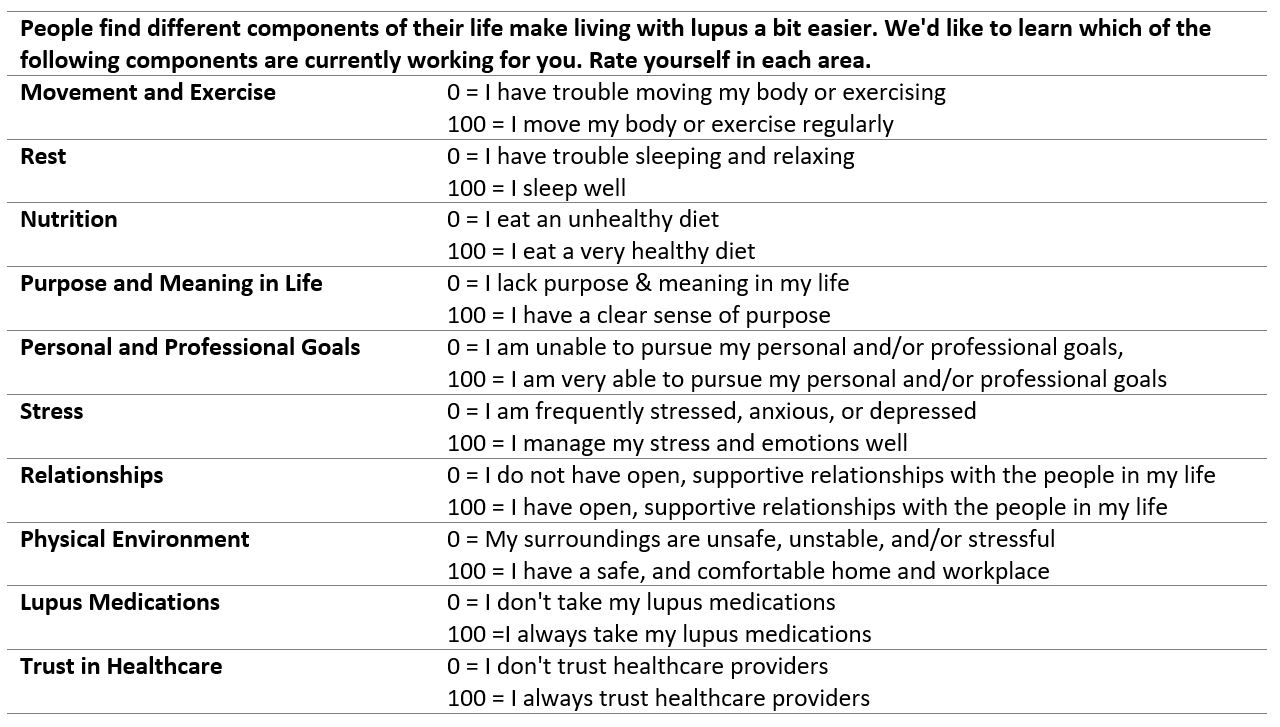Session Information
Date: Sunday, October 26, 2025
Title: (0357–0386) Patient Outcomes, Preferences, & Attitudes Poster I
Session Type: Poster Session A
Session Time: 10:30AM-12:30PM
Background/Purpose: Care models that take a ‘Whole Health’ perspective by emphasizing personalized care focused on the individual’s values, needs, and goals, rather than solely on medical conditions are sorely needed for patients with SLE. Enhancing self-care can significantly improve overall well-being but is often missing from SLE management. This study aims to identify the greatest self-care needs for individuals with SLE using a modified Whole Health Self-Assessment survey, focusing on differences by subgroups of Type 2 SLE activity (Intermittent and Persistent).
Methods: Patients with SLE enrolled in a lupus registry completed the Polysymptomatic Distress Score (PSD), FACIT Fatigue scale, PROMIS measures, and a modified Whole Health Self-Assessment, rating their health on a visual analog scale across 10 domains (Table 1). Participants also selected their three most important areas for self-care. Rheumatologists scored the SLEDAI and Type 1 & 2 physician’s global assessments (PGA). Spearman’s correlation coefficients measured the correlation of Whole Health domain scores with disease activity and PROMIS measures. Correlations were classified as strong ( >0.5), moderate (0.3-0.5), weak (0.1-0.3), or absent (< 0.1).High Type 1 SLE activity was defined as SLEDAI ≥6, clinical SLEDAI ≥4, Type 1 PGA ≥1, or active nephritis. High Type 2 SLE activity was defined as PSD ≥8 or Type 2 PGA ≥1. Among patients with ≥3 visits in the registry, Type 2 SLE patterns were classified as:No Type 2 SLEIntermittent Type 2 SLE: Type 2 SLE activity at ≤2 visits and Type 1 SLE activity at ≥1 visitPersistent Type 2 SLE: Type 2 SLE activity at 3 visits and Type 1 SLE activity at < 3 visits, or Type 2 SLE activity at ≥2 visits and Type 1 SLE activity at 0 visitsDifferences in median Whole Health Assessment scores across Type 2 pattern groups were compared using the Kruskal-Wallis test.
Results: We included 295 patients with SLE (mean age 44 years, 92% female, 60% Black, 33% White). Strong correlations were observed between Personal & Professional Goals with the SSS (r=-0.54) and FACIT Fatigue score (r=0.61; Table 2). Type 2 SLE activity measures were moderately correlated with Movement & Exercise, Rest, Purpose & Meaning in Life, Personal & Professional Goals, Stress, and Relationships. Weak correlations were found between Type 1 PGA and Purpose & Meaning in Life (r=-0.23) and Personal & Professional Goals (r=-0.23). Among 194 patients with ≥3 visits, patients with Persistent Type 2 SLE had worse scores across several Whole Health domains (Figure 1). When asked to indicate the areas of self-care most important to them, all groups selected “Rest” as the top domain (67-79%), followed by Movement & Exercise (42-51%), Nutrition (35-47%), and Purpose & Meaning in Life (39-40%).
Conclusion: Significant correlations were observed between Whole Health domains and Type 2 SLE activity measures, with scores decreasing as Type 2 SLE activity worsened. These findings helped support our development of a curriculum for a ’Whole Health’ program aimed at improving self-care and quality of life for patients with SLE through education, peer support, and goal setting outside of the clinical setting. Incorporating these insights into routine care can help address what matters most to patients.
 Table 1. The Whole Health Self-Assessment completed by patients with SLE.
Table 1. The Whole Health Self-Assessment completed by patients with SLE.
.jpg) Table 2. Correlation of Whole Health Assessment Domains with Type 1 & 2 SLE Measures.
Table 2. Correlation of Whole Health Assessment Domains with Type 1 & 2 SLE Measures.
.jpg) Figure 1. Differences in Median Whole Health Domain Scores by Type 2 SLE Pattern.
Figure 1. Differences in Median Whole Health Domain Scores by Type 2 SLE Pattern.
To cite this abstract in AMA style:
Eudy A, Clowse M, Burshell D, Drake C, Somers T, Pisetsky D, Sadun R, Snyderman R, Sun K, Criscione-Schreiber L, Maheswaranathan M, Harris N, Doss J, Rogers J. Assessing Whole Health Needs in Systemic Lupus Erythematosus [abstract]. Arthritis Rheumatol. 2025; 77 (suppl 9). https://acrabstracts.org/abstract/assessing-whole-health-needs-in-systemic-lupus-erythematosus/. Accessed .« Back to ACR Convergence 2025
ACR Meeting Abstracts - https://acrabstracts.org/abstract/assessing-whole-health-needs-in-systemic-lupus-erythematosus/
